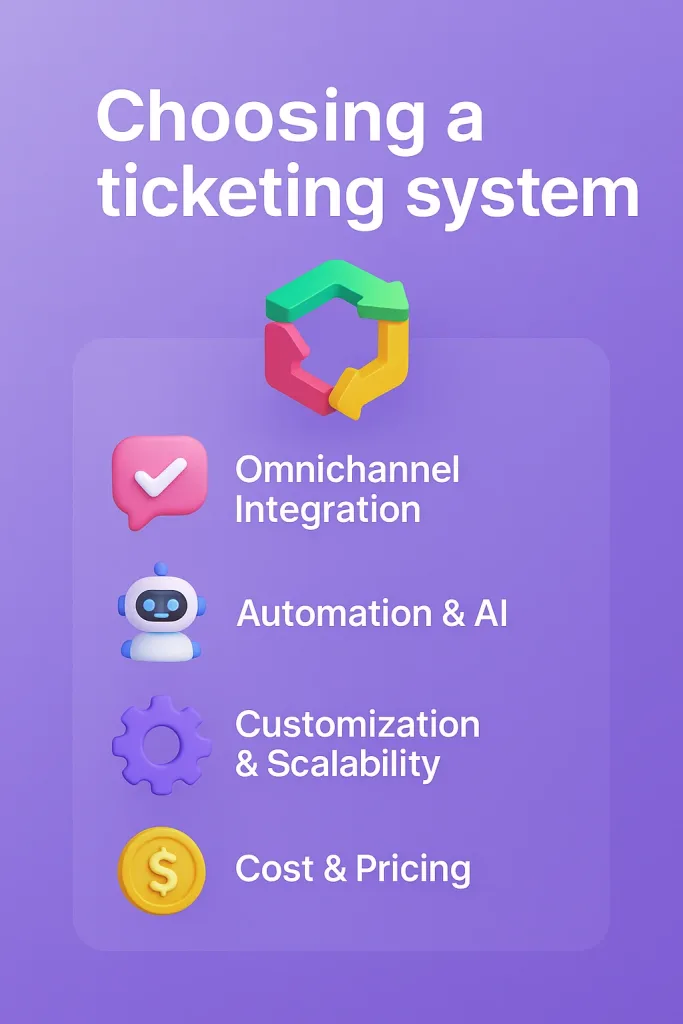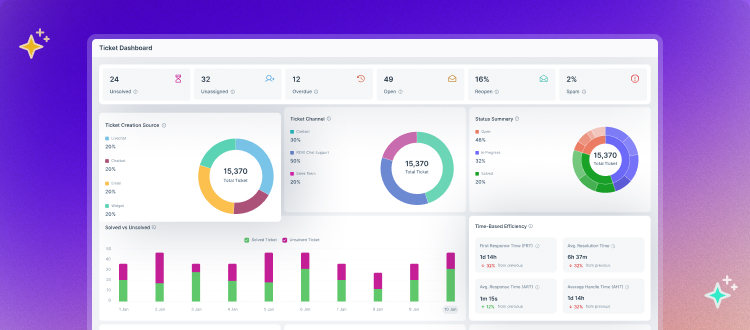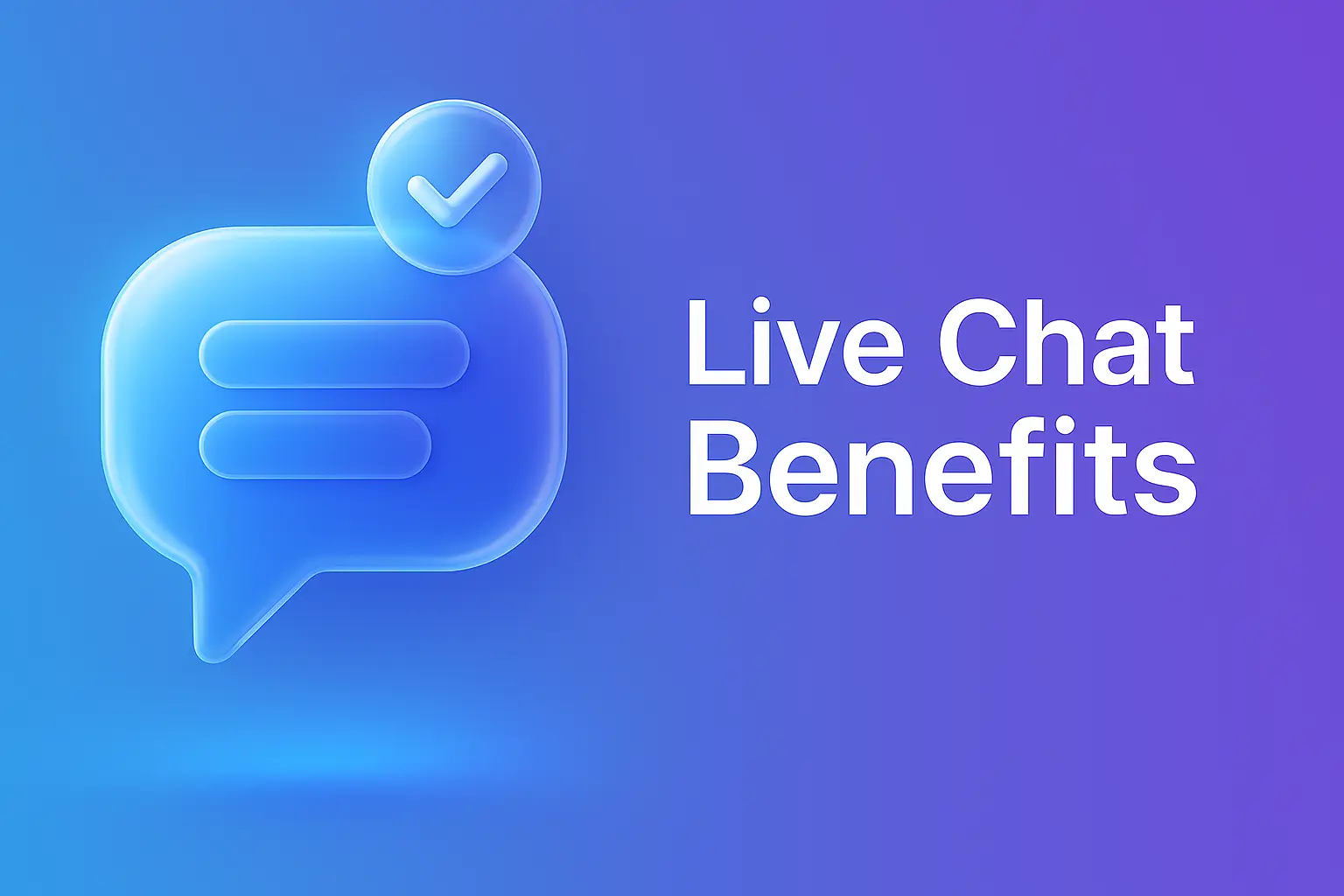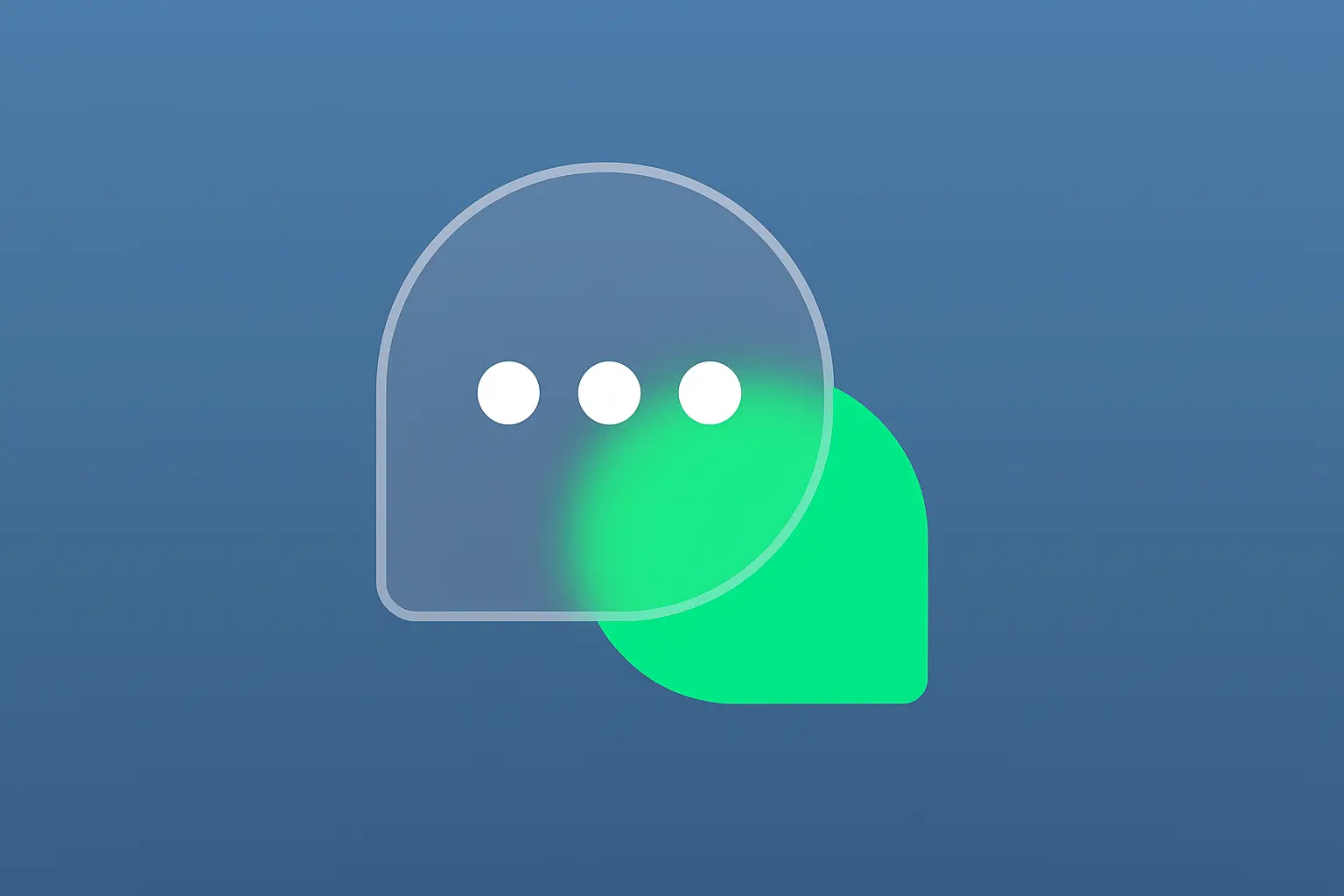Top 7 Ticketing System Examples for Businesses (2025)
- February 17, 2025
- 11 mins read
- Listen

Are you an online business owner, and your team is juggling customer inquiries from emails, phone calls, and social media? For instance, a customer submits an urgent issue via email, but it gets buried in the inbox. Another sends a message on Facebook, and no one notices it until hours later.
Sounds familiar? By turning every customer interaction into a trackable ticket, you ensure nothing falls through the cracks. A ticketing system can help manage and resolve customer queries efficiently.
But with so many options out there, how do you choose the right one for your business? To help you make the best decision, we’ve compiled the top 7 ticketing system examples for your business. Let’s explore.
What is a Ticketing System?
A ticketing system is a software solution that helps businesses manage, track, and resolve customer support requests efficiently. It automatically converts customer inquiries into tickets, allowing support teams to prioritize, assign, and monitor progress in a structured way.
Unlike traditional email-based support, a ticketing system centralizes all requests, preventing lost or delayed responses. It also offers automation, categorization, and real-time tracking, ensuring faster resolution times and improved customer satisfaction.
Learn more: What is a Ticketing System? How Does It Work & Examples
Key Considerations for Choosing a Ticketing Software
Choosing the right ticketing software is a game-changer. Whether you’re managing customer support, IT service requests, or event ticketing, the right tool streamlines operations, improves response times, and enhances customer satisfaction. But with so many options available, how do you pick the best one?
Here are the essential factors to consider before making your decision.

Omnichannel Integration
Customers expect seamless support across multiple platforms, including email, live chat, social media, and phone. A unified ticketing system helps centralize all conversations into one dashboard, ensuring:
✔ No lost tickets across different channels
✔ Faster response times with real-time tracking
✔ A 360-degree view of customer interactions
Seamless Integration of Live Chat and Chatbot
A modern ticketing system should seamlessly integrate with live chat and AI chatbots. This ensures that customer queries are addressed instantly and escalated efficiently when needed. Look for:
✔ Real-time chat support linked to ticketing for faster resolutions
✔ AI chatbots that handle common questions and create tickets for complex issues
✔ Smooth transition from bot to human agents without losing context
Automation & AI Capabilities
Consider choosing a modern ticketing system. A modern ticketing system should include:
✔ AI chatbots to handle common queries instantly
✔ Automated ticket routing based on priority and category
✔ Canned responses & smart replies to save time
UI & UX Experience for Smooth Workflow
A ticketing system should simplify workflows, not complicate them. If your team struggles to navigate the platform, response times will suffer. A clean interface helps reduce ticket resolution time and ensures seamless ticket management. Look for:
✔ Easy-to-use dashboards
✔ Drag-and-drop functionalities
✔ Minimal learning curve for agents and customers
Customization & Scalability
Every business has unique needs. Your ticketing software should allow:
✔ Custom ticket fields to capture relevant details
✔ Automated workflows for ticket assignment and prioritization
✔ Scalability to handle increased demand as your business grows
Reporting & Analytics
A great ticketing system provides:
✔ Detailed reports on ticket resolution times, agent performance, and customer satisfaction
✔ Customizable dashboards for real-time insights
✔ AI-powered analytics to detect patterns and optimize workflows
Cost & Pricing Model
Consider total costs. Some ticketing platforms offer free trials, so test before committing. Consider the following things:
✔ Subscription fees vs. one-time payment models
✔ Additional costs for integrations, extra seats, or premium features
✔ Scalability options for future growth
Customer Support & SLA Guarantees
What happens if your ticketing software goes down? Reliable customer support is crucial. Look for:
✔ 24/7 customer support via multiple channels
✔ A clear Service Level Agreement (SLA)
✔ Comprehensive knowledge base and training resources
Selecting the right ticketing software is an investment in efficiency, customer satisfaction, and long-term growth. Evaluate your needs carefully and choose a platform that aligns with your goals.
7 Best Ticketing System Examples for Customer Support
Choosing the right ticketing system can significantly enhance your customer support experience. Let’s explore seven top-notch options that cater to various business needs.
| Tools | Best For | Key Features | Pricing |
| REVE Chat | Seamless Live Chat and Chatbot integration | Incident management, asset management, and change management | Live chat + Ticketing System price $15 Per Agent/Month |
| ProProfs Desk | User-Friendly Interface | Shared inbox, automation rules, reporting | Starts at $10/agent/month |
| Intercom | Customer Engagement | Live chat, bots, product tours | Starts at $39/month |
| HelpDesk | Simplified Ticket Management | Integrated live chat & chatbot support, Omnichannel dashboard, Advanced analytics, and Scalability | Starts at $29/agent/month |
| Freshservice | IT Service Management | Incident management, asset management, change management | Starts at $19/agent/month |
| Zoho Desk | Contextual Customer Support | Multichannel support, AI assistant, workflow automation | Starts at $14/agent/month |
| Zendesk | Comprehensive Support Suite | Ticketing, knowledge base, community forums | $19 per agent/month (billed annually) |
1. REVE Chat

REVE Chat’s ticketing system empowers businesses with AI-driven automation and omnichannel support. It allows customers to connect with agents via live chat, social media, messaging apps, and email, ensuring seamless interactions. The platform integrates with third-party apps and CRM tools to enhance workflow efficiency.
Collaboration tools like real-time monitoring, agent handovers, and chatbot-human transitions help support teams provide a smooth customer experience. REVE Chat also offers AI-powered self-service options, reducing ticket resolution time. Other features include intelligent routing, reporting, and automated workflows.
Key Features
- Customizable Ticket Forms: Enable customers to create and track tickets independently. It enhances self-service and reduces agent workload.
- Dynamic Ticket Status: Monitor and update ticket statuses based on issue progression to ensure clear communication and transparency.
- Ticket Widget: Allow customers to submit tickets directly from an embedded widget, streamlining the support process.
- Ticket Segmentation: Categorize tickets based on issue type, enabling faster prioritization and resolution.
- Advanced Ticket Filters: Filter tickets by specific issues or criteria, helping agents focus on high-priority requests.
- Comprehensive Ticketing Dashboard: Gain insights into key metrics like First Response Time (FRT) and Initial Response Time (IRT) for real-time performance tracking.
- Import Ticket & Email Sync: Seamlessly import tickets from existing systems or sync with email platforms for a unified support experience.
- Ticket Folder Organization: Organize tickets into folders to streamline workflows and improve issue resolution efficiency.
- AI-Powered Chatbots & Automation: Handle routine queries and route complex issues to agents with context, minimizing response times.
- Omnichannel Support: Manage interactions across Live Chat, WhatsApp, Facebook Messenger, and more from a single dashboard.
- Real-Time Monitoring & Analytics: Track agent performance and customer satisfaction with advanced reporting tools.
- Third-Party Integrations: Connect with CRM systems and other tools to enhance workflow efficiency.
Customer Feedback
- REVE Chat’s AI chatbot has significantly reduced our response time. We now handle customer queries faster and more efficiently!” — Emma L., E-commerce Manager
- “REVE Chat’s ticketing system integration with our CRM made a game-changer for our support team.” — David R., Customer Support Lead
2. ProProfs Desk
ProProfs Desk simplifies ticket management with an intuitive and user-friendly interface. It enables businesses to track customer queries through a shared inbox, ensuring that no request goes unanswered. The platform offers automation features to categorize, assign, and escalate tickets based on priority.
With built-in collaboration tools like internal notes and @mentions, teams can work together efficiently to resolve customer issues. ProProfs Desk also includes AI-driven analytics, reporting, and self-service knowledge bases to enhance customer satisfaction.
Key Features
- Shared inbox for team collaboration
- Ticket automation and escalation rules
- Live chat and email ticketing
- Custom workflows and SLA management
- AI-powered reporting and analytics
- Knowledge base and FAQ support
Customer Feedback
- “Managing tickets has never been this easy! The shared inbox keeps our entire team aligned.” — Jake P., IT Support Manager
- “ProProfs Desk’s automation features have saved us hours of manual work. Highly recommended!” — Sophia M., Customer Service Supervisor
3. Intercom
Intercom’s ticketing system is designed for customer engagement and personalized support. It integrates live chat, AI-powered bots, and automation to create a seamless customer experience. Businesses can manage customer interactions via messaging apps, email, and web chat, ensuring a unified support process.
Intercom also enables proactive support through targeted messages and product tours, helping businesses onboard customers effectively. With its automation workflows and self-service portals, businesses can optimize their support processes and reduce ticket resolution times.
Key Features
- AI-powered bots for automated responses
- Live chat with proactive messaging
- Omnichannel support (email, in-app, social messaging)
- Workflow automation and chat routing
- Customizable reporting and analytics
- Knowledge base and self-service options
Customer Feedback
- “Intercom has helped us scale our support without increasing team size. The chat automation is a lifesaver!” — Mark T., SaaS Product Manager
- “Our customer engagement has skyrocketed since switching to Intercom. Highly intuitive and powerful!” — Lisa D., Growth Manager
4. HelpDesk
HelpDesk’s ticketing system simplifies customer support by providing an intuitive platform for managing customer queries. It streamlines ticket organization, ensuring that requests are automatically assigned to the right team members based on predefined rules.
The platform also offers collaboration features like internal notes and shared tickets, making it easier for teams to work together. With automation tools, canned responses, and detailed reporting, HelpDesk helps businesses optimize their support operations and enhance customer satisfaction.
Key Features
- Easy-to-use ticketing system
- Automation rules for ticket assignment
- Shared tickets and team collaboration tools
- Canned responses for quick replies
- Reporting and analytics for performance tracking
- Integration with third-party apps
Customer Feedback
- “HelpDesk’s automation features have saved our team so much time. We can now focus on solving complex issues instead of manual ticket management.” — Tom W., Customer Support Specialist
- “The shared ticketing system is a game-changer! Our team collaborates seamlessly, reducing response times.” — Sarah B., Operations Manager
5. Freshservice
Freshservice is an IT-focused ticketing system designed to streamline incident management and IT service operations. AI-powered automation simplifies request handling and ensures tickets are categorized and prioritized efficiently.
The platform includes asset management, allowing businesses to track IT resources, software licenses, and configurations. Additionally, Freshservice offers a self-service portal where employees can find solutions to common issues without reaching out to support.
Key Features
- AI-powered ticket automation
- IT asset and change management
- Self-service portal for end-users
- SLA (Service Level Agreement) tracking
- Customizable workflow automation
- Detailed reporting and analytics
Customer Feedback
- “Freshservice has completely transformed our IT support. The automation and asset management tools are fantastic!” — Daniel H., IT Director
- “The self-service portal reduces the number of tickets we receive, helping our team focus on urgent IT requests.” — Julia S., Help Desk Manager
6. Zoho Desk
Zoho Desk’s ticket management system helps customer-facing support teams track requests. It offers omnichannel support, allowing customers to connect with agents via email, social media, live chat, telephony, web forms, or social messaging apps. Zoho Desk supports third-party apps and integrates with its suite of native products.
Collaboration tools like team feeds, @mentions, and shared tickets enable support agents to collaborate on issues to avoid transfers and escalations. Other features of Zoho Desk’s customer service ticketing system include reporting and analytics tools, escalations, and automated workflows. Users can also manage multiple help centers with knowledge bases, FAQs, and communities for different brands.
Key Features
- Generative AI agents
- AI-powered self-service
- Omnichannel support
- Workflow automation
- Reporting and analytics
- Knowledge base
- Custom dashboards
Customer Feedback
- “Zoho Desk’s AI-powered assistance has made our support team more efficient. Customers love the quick responses!” — Lucas G., Support Team Lead
- “The ability to integrate Zoho Desk with our existing CRM has streamlined our workflows significantly.” — Emma V., Business Analyst
7. Zendesk
Zendesk is a powerful and scalable customer service platform that offers robust ticketing and help desk solutions. It supports multichannel communication, allowing businesses to manage tickets from email, live chat, social media, and messaging apps in one unified dashboard.
Zendesk also provides a comprehensive knowledge base, AI-driven automation, and self-service portals to help businesses reduce ticket volume. Its extensive customization options and integrations make it a flexible choice for companies of all sizes.
Key Features
- Advanced ticketing system with automation
- AI-powered chatbots and a self-service portal
- Multichannel support (email, live chat, social media, etc.)
- SLA and escalation management
- Detailed reporting and performance analytics
- Extensive third-party integrations
Customer Feedback
- “Zendesk’s automation has drastically improved our ticket resolution time. It’s a must-have for growing support teams!” — Rachel C., Customer Experience Manager
- “We love the knowledge base feature—it has reduced our support tickets and empowered customers to find answers on their own.” — Brian T., Operations Lead
Conclusion
Choosing the right ticketing system is crucial for delivering seamless customer support and streamlining your business operations. Whether you’re looking for an AI-powered help desk, IT service management, or a scalable omnichannel platform, the options we’ve covered, offer robust solutions tailored to different business needs.
When selecting a ticketing system, consider factors like automation, integrations, ease of use, and reporting capabilities to ensure it aligns with your customer service goals. A well-implemented ticketing system doesn’t just improve efficiency; it enhances customer satisfaction and drives long-term business success.
Still unsure which one is the best fit for your business? Start with a free trial or a live demo to experience how the ticketing system can transform your support process.
Frequently Asked Questions
A ticketing system is a software application designed to manage and track customer support requests, issues, or inquiries. It converts these interactions into “tickets,” allowing support teams to monitor progress, prioritize tasks, and ensure timely resolutions.
When a customer submits a query through channels like email, chat, or web forms, the system automatically generates a ticket containing details about the issue. This ticket is then categorized, prioritized, and assigned to the appropriate support agent or team. Throughout its lifecycle, the ticketing system tracks updates, facilitates communication, and maintains a record until the issue is resolved and the ticket is closed.
Essential features of an effective ticketing system include:
1. Multi-channel support: Ability to handle requests from various platforms (email, chat, social media).
2. Automation: Automated ticket assignment, routing, and escalation to improve efficiency.
3. Knowledge base integration: Providing self-service options for common issues.
4. Reporting and analytics: Insights into metrics like response times and customer satisfaction.
5. Customization: Ability to tailor workflows, fields, and user interfaces to fit specific business needs.
Implementing a ticketing system offers several advantages:
1. Improved organization: Centralizes all customer inquiries in one platform.
2. Enhanced efficiency: Automation reduces manual tasks, allowing support teams to focus on complex issues.
3. Better customer satisfaction: Timely and effective responses lead to happier customers.
4. Data-driven decisions: Analytics provide insights into performance and areas for improvement.
Yes, most modern ticketing systems can integrate with various other applications, such as:
1. Customer Relationship Management (CRM) systems: To provide a unified view of customer interactions.
2. Email platforms: For seamless communication.
3. Live chat tools: To capture real-time customer interactions.
4. Collaboration tools: Enhancing internal communication among support teams.



